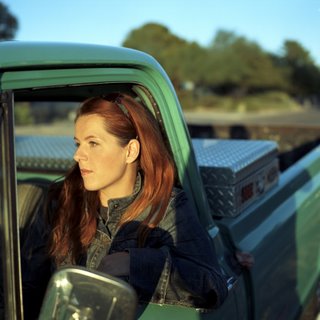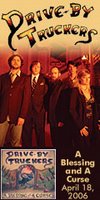
I could fill this entire blog debating the relative merits of Steve Earle – not just his music, but the man. However, in the interest of space and time, let’s just leave it at this: whatever else you think of Steve Earle – musician, songwriter, poet, playwright, author, activist, radio host, lefty, Texan, New Yorker and all-around rabble-rouser – you have to admit he is one hell of a great record producer.
As few of you will recall, Steve Earle in the mid 1990’s was a ferocious man of music. Not only was he churning out (following his dark days earlier in the decade) a classic record just about every 15 months or so, he was running a small record label and producing albums for other artists with partner Ray Kennedy (known collectively as “the twangtrust”). Earle and Kennedy are best known for the re-recording Lucinda Williams’ now-classic
Car Wheels on a Gravel Road, which won Williams and the twangtrust a Grammy. In between his near-perfect run of albums (which includes
Train A Comin’,
I Feel Alright,
El Corazon,
The Mountain – a bluegrass album with The Del McCoury Band – and
Transcendental Blues), Earle signed and produced young (and mostly forgotten) artists like 6 String Drag, The V-Roys, Bap Kennedy, Siobhan Maher-Kennedy (Ray’s wife) and Cheri Knight (formerly of the Blood Oranges).
It is Cheri Knight’s
The Northeast Kingdom which I believe most strongly makes the case for the greatness of Earle and the twangtrust. Though Eric Ambel – currently serving as Earle’s guitarist, but a solid producer in his own right – produced Knight’s excellent solo debut
The Knitter, it is
The Northeast Kingdom which continues to ensnare me year after year since its release eight years ago. A startling statement from an artist – virtually unknown then and now –
The Northeast Kingdom is the blueprint for what can happen when the right artist hooks up with the right producers and musicians at presumably the right time. The mythical allure of this long forgotten (and out of print) gem is strengthened by the fact that it was recorded in just over a week (and no doubt on a shoestring budget). As far as I know, Cheri Knight has all but disappeared from the music industry, but she left behind a flawless achievement by which to remember her.
Per his usual method, Earle jumps right into the proceedings, adding an eerie harmonium to the opening track “Dar Glasgow”, the first of two songs to feature vocals from Emmylou Harris. Harris, of course, is known for her harmony vocals, but other than her work with Gram Parsons, I’m not sure I’ve ever heard anything as sublime as her work here (achieving even greater perfection on the later track “Crawling”). Knight’s deadpan delivery might remind some of Liz Phair at first, but it hints at none of the irony of early Phair and conjures the complete opposite of Phair’s current vapid incarnation.
Anyway, the haunting drone of “Dar Glasgow” gives way to the breakneck romp of “Roses in the Vine,” featuring chiming guitars and the stellar drumming of Will Rigby, who provides memorable support throughout the record. Though Earle’s musical influence can be heard all over
The Northeast Kingdom, Knight also receives exceptional support from her Blood Oranges bandmates Jimmy Ryan and Mark Spencer. In fact, Spencer’s guitar work is the predominant musical voice on the record, screeching and squawling where one might otherwise expect something more sedate. “If Wishes Were Horses” and “Black-Eyed Susie” display sufficient evidence that everyone here showed up to play loud.
But the album has plenty of quiet moments, not the least of which is the aforementioned “Crawling.” I have occasionally (and poorly) described certain rare musical moments as the sound of the universe caving in. “Crawling” is just such a moment. Simple and deliberate, and anchored by a gut-wrenching harmony vocal by Emmylou, the chorus says it all:
And I’m crawling,
With my heart in my hands,
I’d be a fool and I’d crawl back to you,
And you’d send me away.
Tell me something,
Have you always been so cruel?
I know I’ve gotta do something bout you,
But nothing is all I can do.
Love rejected and lovers spurned are about the oldest pop music topics going, but I don’t think those lyrics can really be topped for sheer directness and simplicity. Truly, truly a great song and performance, on a truly great album.
“The Hatfield Side” deals with a mainstay of country music – age-old blood feuds – but Knight’s fat bass line (oh, did I forget to mention that this lady plays fuckin’ bass, too?) and Rigby’s pounding drums belie the subject’s backwoods origins. Siobhan Maher-Kennedy (who would later record Knight’s “Light In The Road” from The Knitter) also supplies an impressively gorgeous harmony vocal. “White Lies” is the only unmistakable honky-tonk cut on the album, and it manages to fill a void that you only really detect when you hear the song. But fear not – Knight comes rocking back with “Dead Man’s Curve.”
As the album’s end draws near, the narrator of “Crawling” returns, but this time with a spine. “Sweetheart” opens with a blazing duel of electric guitar and fiddle, followed by Jimmy Ryan’s indelible mandolin, and poses the question quite simply:
Sweetheart, honey, do you favor another?
Later, the question is posed:
Why’d you run out across the field,
Why’d you take your heart and go?
And leave me trying to find
Your footprints in the snow?
While the tone might appear to beseech the departed lover, Knight’s delivery seems to demand an answer rather than just ask for one.
A brief reprise of the earlier track “Black-Eyed Susie” ends the album quickly, but
The Northeast Kingdom is not so easily forgotten. An indelible slice of Americana (the true kind, not just the musical genre), this record is a crowning achievement. Though I began this treatise praising the work of Steve Earle and Ray Kennedy, no one should believe for a moment that this isn’t Cheri Knight’s singular work. What the twangtrust have done so well, particularly with newer artists, is help them achieve their potential without sacrificing their personalities. Earle deserves high praise for believing in artists like Cheri Knight, and Cheri Knight deserves recognition for creating albums like
The Northeast Kingdom.
You can read more about Cheri Knight (circa 1998)
here. Though it is out of print,
The Northeast Kingdom can easily be obtained from Amazon's third-party sellers
here.
Incidentally, Steve Earle returns to the boards as producer of Allison Moorer's new album
Getting Somewhere, due June 13.
 I take it back - I've got a little more information for you on Allison Moorer's new record Getting Somewhere...
I take it back - I've got a little more information for you on Allison Moorer's new record Getting Somewhere... 














